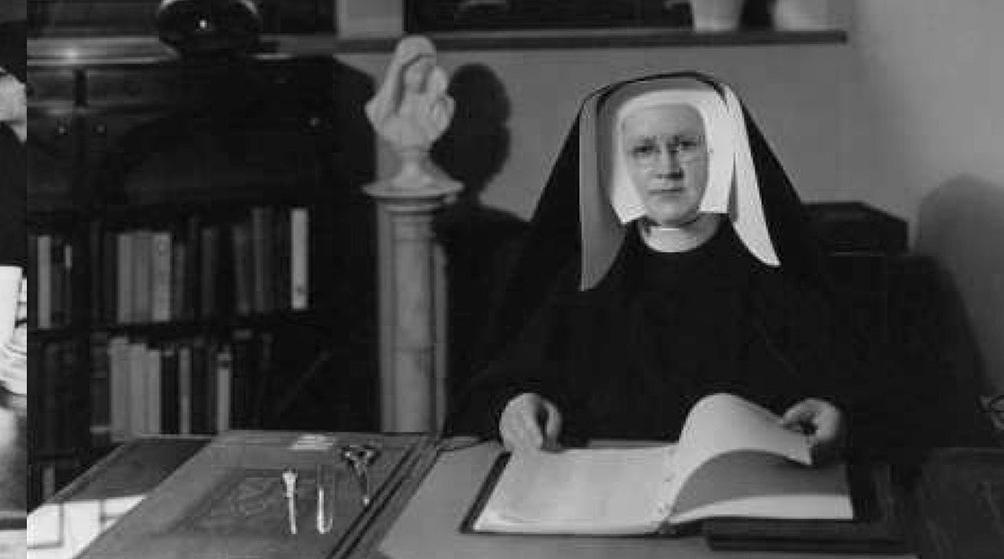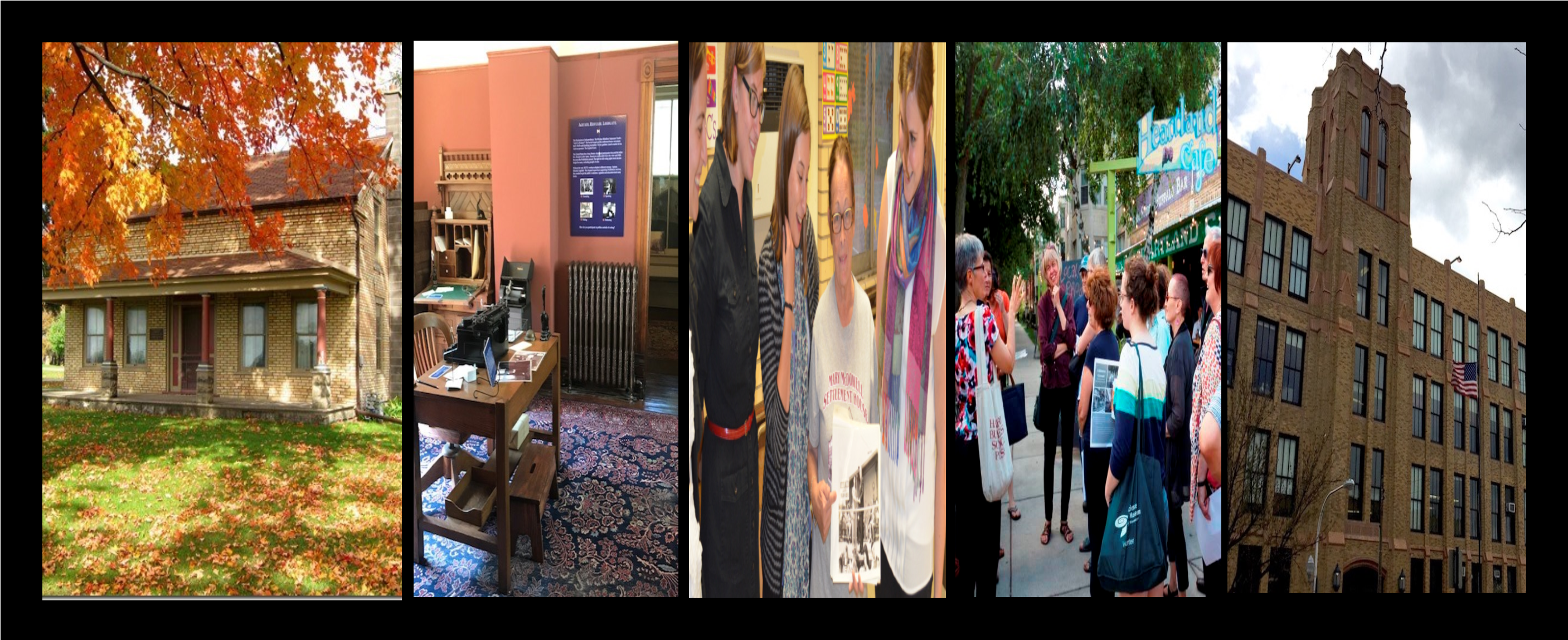archive
.png)
EVENTS
Whale Watching in the Medieval North Atlantic
On Monday, February 4, join Dr. Vicki Szabo, author of Monstrous Fishes and the Mead-Dark Sea: Whaling in the Medieval North Atlantic (Brill, 2008), for an exciting lecture exploring marine mammal use and populations in premodern Europe! This talk is the first "Medieval Environments" lecture of the semester, a collaboration between Loyola's Medieval Studies Center and Institute for Environmental Sustainability.
DETAILS
EVENTS
Where Historians Teach Panel Discussion
Thinking about careers? Currently on the job hunt? Join us on Tuesday, April 9 at 4pm in Cuneo 312 for a panel on "Where Historians Teach: A Discussion About Teaching Careers for Historians in Secondary Ed, Higher Ed, and Public History." Panelists include: Sarah Doherty, PhD, Assistant Professor of History at North Park University; Bryan Escobar, MA, Public Historian, Arts and History Specialist, Waukegan Park District; Amelia Serafine, PhD, Instructor, San Antonio College; Charles Tocci, PhD, Assistant Professor, School of Education, Loyola University Chicago.

SPOTLIGHT
Voices from Mundelein: Media Portal
This past summer, graduate students Jenny Clay and Nathan Ellstrand worked with the Women and Leadership Archives to create the Voices from Mundelein: Media Portal. Showcasing images alongside more than 30 interviews, the site shares the stories of women religious, students, staff, and faculty from Mundelein College.
VIEWHistorians in the Field: Ramblers at the 2019 AHA Conference
The American Historical Association took Chicago by storm this month and the Ramblers were there to greet them.

EVENT
Welcome Back Night for History Majors
All history majors are invited to attend a welcome back info session on September 11 at 4 PM in Crown Center 528. Learn more about the program, what requirements are needed to graduate, what you can do with a history degree post graduation, and ask any other questions you may have about the program.
DETAILSRamblers in the Field: Class Projects Turn Into Tours, Exhibits, Nominations, and Awards

Students at Loyola used the skills they learned in the classroom to work on various projects.
Historic Peterson Farm National Register of Historic Places Nomination
It started as an assignment for Dr. Theodore Karamanski's Management of Historical Resources class for Ph.D. candidates Sean Jacobson and Emily-Paige Taylor. Representatives from the Illinois State Historic Preservation Office (Illinois SHPO) worked with the class to help them all understand the National Register nomination process and do preliminary reviews of their nominations. Sean and Emily-Paige focused on nominating the Historic Peterson Farm in McHenry, IL. Unexpectedly, they secured a National Register nomination for the Peterson Farm in McHenry, IL.
Amy Hathaway, one of the Illinois SHPO representatives, later invited Sean and Emily to her panel for the Illinois History Conference in October 2019 to talk about their nomination for the Peterson Farm in McHenry, IL. Emily-Paige expressed that prospective students would be interested in knowing “...our professors try to connect us to other professionals in the field and that our classwork often leads to external opportunities”.
In November, the nomination for the Historic Peterson Farm received a unanimous recommendation by the IL SHPO to be added to the National Register of Historic Places.
Internship at Frances Willard House Museum
During the summer of 2019, Hannah Overstreet was the Daughters of the American Revolution - Fort Dearborn Collections Intern at the Frances Willard House Museum. Her primary responsibility was to curate, design, and install a temporary exhibit for the front rooms of the house. Since 2019 is the centennial of the ratification of the Eighteenth Amendment (Prohibition), she decided to center the exhibit around women and Prohibition. Frances Willard was a key leader in the temperance movement, and it's because of the temperance movement that prohibition became a major issue in the decades following Willard's death.
The exhibit, "Women and Prohibition: 'A War of Mothers and Daughters, Sisters and Wives'" spans from the 1880s to 1920 and showcases items from the Frances Willard Archives and collections, including a pen used to sign the Eighteenth Amendment and some original Polyglot Petitions circulated to raise support for temperance. Hannah also wanted to highlight the house itself, since Woman's Christian Temperance Union (WCTU) workers used it as the center of their operations for so long. The office, in particular, is set up to show what it might have looked like at the height of the Prohibition campaign.
“It was fascinating to do so much research on a topic people have such strong associations with”, Hannah said about the exhibit, “A century later, it's strange to think that people cared so much about this particular single issue, but in researching and writing for the exhibit, I discovered how much temperance had to do with other issues of its time, not to mention issues we still face today - immigration, public health, and gender, for example”. Hannah expressed that creating "Women and Prohibition" was also a great opportunity to connect Frances Willard's life with the political and social world around her as well as to explore the impact she continued to have after her death in 1890.
This was Hannah’s first time curating an exhibit solo, “I definitely learned a lot, including why exhibits are more often team projects! There are already things that I would probably do differently, but I hope that ‘Women and Prohibition’ sheds a little light on a topic that is much more complex than it appears on the surface”.
The Chrysler Village History Project
The Chrysler Village History Project won the National Council on Public History Student Project Award, Honorable Mention for the Alice Smith Prize in Public History from the Midwestern History Association, and an Award of Merit from the American Association for State and Local History (AASLH).
The Chrysler Village History Project is a collaborative project that brought together Loyola public history graduate students and various community stakeholders to preserve and share the dynamic and diverse histories of the Chrysler Village neighborhood on Chicago’s southwest side through a community festival, a community-driven mural contest, an oral history project, and a content-rich website. Growing out of a National Register Historic District nomination in Dr. Ted Karamanski’s 2013 Management of Historic Resources class and benefitting from additional inspiration and support from Dr. Patricia Mooney-Melvin's 2014 Public History Methods and Theory class and Dr. Chris Manning's Oral History Methods class in 2015, the Chrysler Village History Project is an excellent example of how class projects at Loyola can evolve and grow into independent, large-scale, meaningful public history practice in the community. The Chrysler Village History Project also benefited from collaboration with Public History Lab, a graduate student-run organization that provides a forum and support for public history projects outside of coursework.
Walking Tour of Glenwood Avenue Arts District
On August 23, 2015, Loyola history master’s student Kristin Jacobsen led a walking tour of the Glenwood Avenue Arts District in Chicago’s Rogers Park neighborhood for the Rogers Park/West Ridge Historical Society (RP/WRHS). Her walking tour stemmed from projects undertaken by student groups in Dr. Patricia Mooney-Melvin’s graduate Public History Methods and Theory course (HIST 480) during the fall 2014 semester. For the project, HIST 480 students produced walking tour scripts about Rogers Park and West Ridge history for the RP/WRHS. Jacobsen’s group, which also included master’s students Blake Kennedy, Lauren O'Brien, and Andrew Paddock, produced a tour that explored Rogers Park’s Glenwood Avenue Arts District and presented the concept to the RP/WRHS President and Vice-President in December 2014. Jacobsen agreed to lead the tour for RP/WRHS members the following August.
Lucy Flower Technical High School NRHP Nomination
Ph.D. student Ruby Oram presented her National Register of Historic Places nomination for the Lucy Flower Technical High School for Girls to the Illinois Historic Preservation Agency. The school is located in the Garfield Park neighborhood of Chicago and was built in 1927. It functioned as the city’s only all-girls public school from 1927-1978 and the second vocational school for women in the nation. It was also racially-integrated from its founding: civil rights activist Ida B. Wells sent her daughters there. As a “technical” school for girls, Flower Tech provided very gender-specific job training in fields like dressmaking, millinery, nursing, beauty culture, and institutional cookery, as well as required home economics coursework for future wives and mothers. Today, the building serves as Al Raby High School.
Following her presentation, the Illinois Historic Preservation Agency unanimously approved Oram's nomination. Her success makes the Lucy Flower Technical High School for Girls one of the only National Register locations in the state associated with women’s history specifically.
